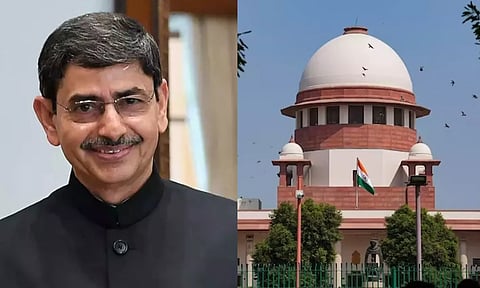

CHENNAI: Noting that the petition filed by the Tamil Nadu government against Governor RN Ravi for the delay in assenting Bills passed by the State legislature raised a “matter of serious concern”, the Supreme Court issued notice to the Union government seeking its response.
The bench headed by Chief Justice of India (CJI) DY Chandrachud, also comprising Justices JB Pardiwala and Manoj Misra, said it would take up the matter immediately after the Deepavali break, tentatively on November 20.
“The issues raised are of great concern. From the tabulated statements, it appears that as many as 12 Bills submitted to the Governor under Article 200 have not elicited any further action, and other matters regarding the proposal for grant of sanction, premature release and appointment of public service commission are pending,” the bench noted in its order, and also sought the assistance of Attorney General R Venkataramani or Solicitor General Tushar Mehta.
Appearing to the State government, senior advocate Abhishek Manu Singhvi said Bills passed two to three years ago were still pending with the Governor for assent. The government was also waiting for sanction to prosecute ex-ministers or MLAs accused of corruption, and more than 54 files related to remission of prisoners.
Senior advocates Mukul Rohtagi and P Wilson also apprised the court that 10 out of 14 posts were vacant in the Tamil Nadu State Public Service Commission.
The plea filed under Article 32 of the Constitution alleged that Governor Ravi has positioned himself as a “political rival” to the legitimately elected State government.
The State government sought directions from the SC to stipulate the outer time limit for the Governor to consider Bills sent for his assent under Article 200 of the Constitution. It further sought directions for the disposal of all the Bills, files and orders, which were pending with the Governor’s office, within a specified timeframe.
According to Article 200, the Governor has four options when a Bill comes before him/her for assent: grant assent; withhold it; reserve it for the President’s consideration; or return it for reconsideration. The Governor can also recommend introducing amendments or changes as he thinks appropriate. If the Bill is adopted again with or without amendments and is presented for assent, he/she has to grant it.
In another petition, the government also challenged the Governor’s decision to unilaterally constitute the search committees for appointment of Vice Chancellors in three State universities.
Guv playing with fire
Expressing its unhappiness over the deadlock between Punjab government and Governor over assent to Bills passed by the Assembly, the Supreme Court on Friday said it was a matter of “serious concern”.
A bench of Chief Justice DY Chandrachud and Justices JB Pardiwala and Manoj Misra pulled up Governor Banwarilal Purohit for not giving assent to Bills, saying he was playing with “fire” and questioned his power to term the Assembly session as unconstitutional.
The bench also questioned the government on why it adjourned the budget session instead of proroguing it.
Reminding both the government and Governor that the country has been running on “established traditions and conventions and they need to be followed”, the bench said it will pass a short order to settle the law on the issue of Governor’s power to give assent to Bills.
On November 6, the top court had said that Governors must not be oblivious to the fact that they were not elected representatives, and directed SG Tushar Mehta to place on record the details of action taken by the Governor.